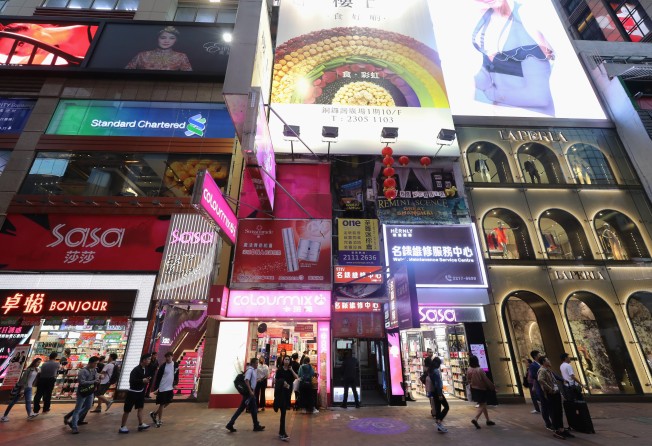Nowhere to hide for Hong Kong retailers as Sa Sa cuts directors’ pay amid slump in cosmetics sales, disappearing mainland customers
- Sa Sa to cut salary of executive directors by 75 per cent for three months as to control costs
- Retail sales in Hong Kong and Macau crashed during the Lunar New Year holiday as coronavirus outbreak kept mainland customers at home

Sa Sa International, Hong Kong’s biggest cosmetics retailer, is asking its executive directors to take a 75 per cent pay cut for three months to help reduce costs, after sales during the Lunar New Year holiday slumped amid the coronavirus outbreak.
The move follows a report showing the group’s sales in Hong Kong crashed by 77.9 per cent in the first week of the Chinese New Year as the coronavirus outbreak kept mainland tourists at home. Including Macau, sales slumped 76.9 per cent.
The company compared its sales data during the January 25 to 31 week with the same festive week last year that fell on February 5 to 11, it said in a Hong Kong stock exchange filing on Thursday.
The crunch suggests there is no immediate relief for Hong Kong retailers after they took a beating from months of anti-government protests in the city for much of 2019. The viral outbreak has now undermined efforts by Sa Sa and other retailers to shift their focus to the mainland market as China locked down cities and curbed travels to contain the outbreak.
“Street front shops in particular have been more affected by the drastic reduction in tourist numbers, and will be facing extra difficulties,” said David Ji, head of research and consultancy of Greater China at Knight Frank. “The virus outbreak has had a big impact on Hong Kong’s retail and tourism industry.”
The number of mainland tourists in Hong Kong shrank by 85.5 per cent from January 24 to 30 from a year earlier, according to government data. Sa Sa said transactions involving mainland tourists plunged 92.1 per cent in Hong Kong, and 76.5 per cent in its Macau stores.
The salary cut represents “the first step in a new round of cost reduction initiatives,” chairman and chief executive Simon Kwok Siu-ming said in the exchange filing. Other moves include trimming store network and inventory, he said.
“The Group will substantially strengthen control measures in order to reduce losses,” Kwok said. It will also review market conditions and adjust its product strategies, he added.
Kwok is one of Sa Sa’s four executive directors, its filing shows. The other three are vice chairman Eleanor Kwok Law Kwai-chun, chief financial officer Guy Look and Melody Kwok Sze-wai.
The deadly coronavirus, which originated in Wuhan, the capital of central Hubei province, has killed at least 565 people and infected more than 28,000, mostly in mainland China. The disease has spread to all 31 provinces and prompted China to lock down major cities in Hubei.
Hong Kong’s retail sales plunged 11.1 per cent last year to HK$431.2 billion (US$55.2 billion), the steepest decline since 1998, following the US-China trade war and anti-government protests. They fell 24.1 per cent in the final three months of 2019, the worst quarter on record, as protests intensified.
The viral outbreak is likely to further reduce tourist arrivals and retail sales in Hong Kong, both of which have been weakened by a recession and social unrest, Moody’s Investors Service said. As a guide, Hong Kong retail sales declined for six consecutive months through July during the Sars (severe acute respiratory syndrome) outbreak in 2003.
Lifestyle International is likely to report a significant drop in revenue during the first half of 2020, given its two Sogo department stores are in major shopping districts frequented by Chinese tourists, Moody’s said in a report on Thursday.
Swire Pacific is also significantly exposed through its 45 per cent-owned flag-carrier Cathay Pacific, beverage businesses in mainland China, and retail property operations in both Hong Kong and mainland China, it added.